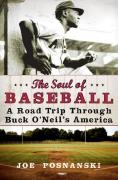


Baseball Toaster was unplugged on February 4, 2009.
Email me at btimmermann@gmail.com
Select a date:
When I checked out my copy of Joe Posnanski’s The Soul of Baseball: A Road Trip Through Buck O’Neil’s America, I was not expecting to like it even though it had been very well-received and I knew that Posnanski was one of the best baseball writers in America today.

The problem I faced was twofold. First, I tend to be cynical, so I assumed that the cult of personality built up around O’Neil was nothing more than hype. Second, I figured that since Posnanski was vehement in his denunciation of the Hall of Fame for not inducting O’Neil that the book would just be a diatribe against Cooperstown.
I cracked the book open aboard a 757 that I boarded in Minneapolis on Monday. I figured I would be able to make a dent in the 276-page book and finish it up over a couple of lunch hours. But that didn’t happen.
Instead, I started reading and didn’t stop until there was nothing more to read. Posnanski had crafted a masterpiece. He was able to portray O’Neil, a man whom obviously admires and loves, as someone who was both an exemplar of what few of us ever could achieve and as an ordinary man, who was really not much different than the rest of us. And knowing that the people we admire have flaws somehow makes them seem more real to me. It makes me realize that I have the potential to achieve something special.
The book is primarily a travelogue as Posnanski follows O’Neil along to various promotions during 2005. Throughout, O’Neil comes across as man who is willing to give just about anybody the benefit of the doubt.
O’Neil takes on a shock jock in New York City and although a bit ruffled by the affair (the radio personality kept calling Jackie Robinson “a sellout”), O’Neil does not swear, he does not get angry. But he’s an old man, what he wants is a nap.
In another stop, O’Neil meets a man in a small town in Kansas who tells him that he hit a home run off of Satchel Paige in an exhibition game. O’Neil indulges the man’s story and even fills in details of it, but later tells Posnanski that the man was lying as he was not old enough to have ever played against Paige. For O’Neil, there was no joy in exposing the man’s lie. He figured that if the man was happy holding on to a false memory, then he should keep it.
While most of us have the perception of O’Neil from Ken Burns “Baseball” PBS series as a talking head telling us tales of larger-than-life Negro League stars, Posnanski shows us what the real Buck O’Neil was. He was a kind man with a charming personality that allowed him to get hugs from total strangers. But he was also a man who didn’t like to talk about himself, but would rather ask strangers about their favorite memories. O’Neil speaks lovingly of his late wife, Ora, but as Posnanski finally finds out, their long marriage may not have been perfect as O’Neil truly loved baseball more than anything else, working for years as a player, coach, and scout.
O’Neil was not a man who looked at the modern game of baseball and would complain that the players in his day were better. He didn’t really care to make those comparisons. He just wanted people, all people, to love the game of baseball. He would tell older people that the game hadn’t changed, just that they had changed and that they needed to connect with the game again and just enjoy it like they did when they were younger.
When O’Neil was asked about some of the issues of 21st Century baseball, he had views that surprised me. When asked about steroids, O’Neil implied that he thinks players from the 1930s and 1940s would have tried illegal substances if it would have helped them become better players. As for today’s salaries, O’Neil said he wouldn’t have minded the extra money.
It isn’t until the very end of the book that Posnanski gets into the special committee on the Negro Leagues that the Hall of Fame put together, which many thought was created mainly to put O’Neil in Cooperstown. But O’Neil was not chosen, although 17 other players and executives were. At the time Posnanski was livid, but O’Neil wasn’t. He was likely very disappointed, but he wouldn’t let that show. He wanted to honor the people chosen and it was O’Neil who gave a speech at the induction ceremony in 2006, a few months before he passed away.
Posnanski’s book made me wish that somehow I could have had the chance to talk to Buck O’Neil. To answer his favorite question to start off a conversation, “What was the first baseball game you attended?” And perhaps like Buck, I should learn to never pass up the chance to talk to a woman in a red dress.
Postscript - Posnanski now has a blog which sprung from the book which is one of the best by a mainstream media writer.
Comment status: comments have been closed. Baseball Toaster is now out of business.